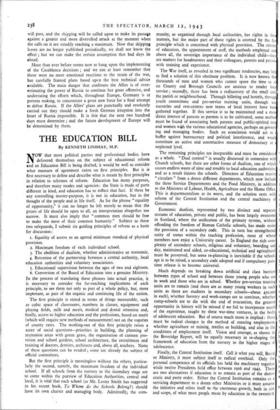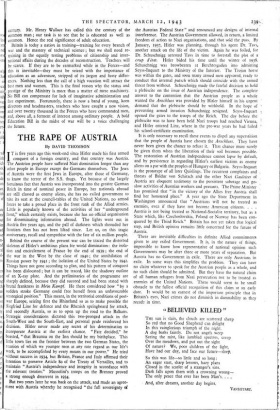THE EDUCATION BILL
By KENNETH LINDSAY, M.P.
i.Equality of access to an agreed minimum standard of physical provision.
2. Maximum freedom of each individual school.
3. The abolition of dualism, whether administrative or economic.
4. Retention of the partnership between a central authority, local education authorities and voluntary associations.
5. Educational supervision between the ages of two and eighteen.
6. Conversion of the Board of Education into a genuine Ministry. In the process of translating these phrases into actual practice, it is necessary to consider the far-reaching implications of each principle, to see them not only as part of a whole policy, but, more impbrtant, as part of the organic and continuing life of the nation. The first principle is stated in terms of things measurable, such as cubic space of classrooms, numbers in classes, equipment and playing fields, milk and meals, medical and dental attention and, finally, access to higher education and the profes'sions, based on merit (which will require new methods of measurement) not on the vagaries of county rates. The working-out of this first principle raises a score of social questions—priorities in building, the planning of
recreation areas with green grass, the organisation of canteen pro- vision and school gardens, school architecture, the recruitment and training of doctors, dentists, architects and, above all, teachers. None of these questions can be evaded ; some are already the subject of official committees.
But the first principle is meaningless without the others, particu- larly the second, namely, the maximum freedom of the individual school. If all schools from the nursery to the ;econdary stage are to come within the purview of Education Authorities, central and local, it is vital that each school (as Mr. Lester Smith has suggested in his recent book, To Whom do the Schools Belong?) should have its own charter and managing body. Admittedly, the corn- munity, as organised through local authorities, has rights in the matters, but the major part of those rights is covered by the fir principle which is concerned with physical provision. The conten of education, the appointment of staff, the methods employed an above all, the sovereign importance of the individual child—thes are matters for headmasters and their colleagues, parents and person with training and experience.
The War itself, as revealed in two significant tendencies, may he to find a solution of this obstinate problem. It is now known tha thousands of men and women who cannot spare the time to s on County and Borough Councils are anxious to render loca service ; secondly, there has been a rediscovery of the small uni the parish or neighbourhood. Through billeting and hostels, throu youth committees and pre-service training units, through w nurseries and rest-centres new teams of local interest have gathered together. If this service is to be maintained and a mo direct interest of parents as parents is to be cultivated, some meth must be found of associating both parents and public-spirited m and women w4h the various educational agencies, perhaps on govern ing and managing bodies. Such an association would act as buffer against bureaucracy and political interference, and woul constitute an active and constructive measure of democracy at neglected level.
The remaining principles are inseparable and must be considere as a whole. "Dual control" is usually discussed in connexion wit Church schools, but there are other forms of dualism, one of which causes endless waste of time and trouble to local-education authorities, and as a result injures the schools. Directors of Education receive " circulars " from a dozen different departments, which now include the three Service Departments and the Food Ministry, in addition to the Ministers of Labour, Health, Agriculture and the Home Office. 1 This is departmentalism at its worst, and the solution rests with ; reform of the Central Institution and the central machinery o Government.
Economic dualism, represented by two distinct and separate streams of education, private and public, has been largely overcome in Scotland, where the unification of the primary system, without offending the freedom of Roman Catholic schools, has made easier the provision of a secondary code. This in turn has strengthened unity of status within the teaching profession, most of whose members now enjoy a University career. In England the rich com- plexity of secondary schools, religious and voluntary, boarding and day, maintained and aided, co-educational, technical and agricultural must be preserved, but some re-planning is inevitable if the school. age is to be raised, a secondary code adopted and if compulsory part- 1 time release is to become universal.
Much depends on breaking down artificial and class barriers between types of school and between those young people who are ( in work and those who are in school. Whether pre-service training s units are to remain (and there are as many young workers in such units as there are students in secondary schools—about 450,000 in each), whether forestry and work-camps are to continue, whether camp-schools are to die with the end of evacuation, the greatest opportunity in history will be missed if we fail to incorporate much of the experience, taught by these war-time ventures, in the body of adolescent education. But of course much more is implied : there must be radical changes in the method of entering employment, whether agriculture or mining, textiles or building, and also in the conditions of employment itself. Vision and courage, as shown in the Beveridge Report, will be equally necessary in re-shaping the framework of education from the nursery to the higher stages of adolescence.
Finally, the Central Institution itself. Call it what you will, Board or Ministry, it must subject itself to radical overhaul. Only the personal competence of its officials has held the machinery together while twelve Presidents held office between 1916 and 1942. There are two alternatives if education is to remain as part of the demo- cratic and party order. Either the Central Institution remains as a servicing department to a dozen other Ministries or it must assume the initiative and relate itself to the enormous growth, both in size and scope, of what most people mean by education in the twentieth century. Mr. Henry Wallace has called this the century of the common man ; our task is to see that he is educated as well as common. Hence the real significance of adult education.
Britain is today a nation in training—training for every branch of war and the mastery of technical science ; but we shall need re- training in the equally testing problems of citizenship and inter- national affairs during the decades of reconstruction. Teachers will be scarce. If they are to be earmarked while in the Forces—and this is inevitable—they must be seized with the importance of education as an adventure, stripped of its jargon and fussy differ- ences. Nothing less than the call of a high vocation will attract the best men and women. This is the final reason why the status and prestige of the Ministry is more than a matter of mere machinery. No Bill can compensate for lack of imaginative administration and free experiment. Fortunately, there is now a band of young, keen directors and headmasters, teachers who have caught a new vision, and over twenty thousand in the Forces who have commanded men, and, above all, a ferment of interest among ordinary people. A bold Education Bill in the midst of war will be a voice challenging the future.



























 Previous page
Previous page